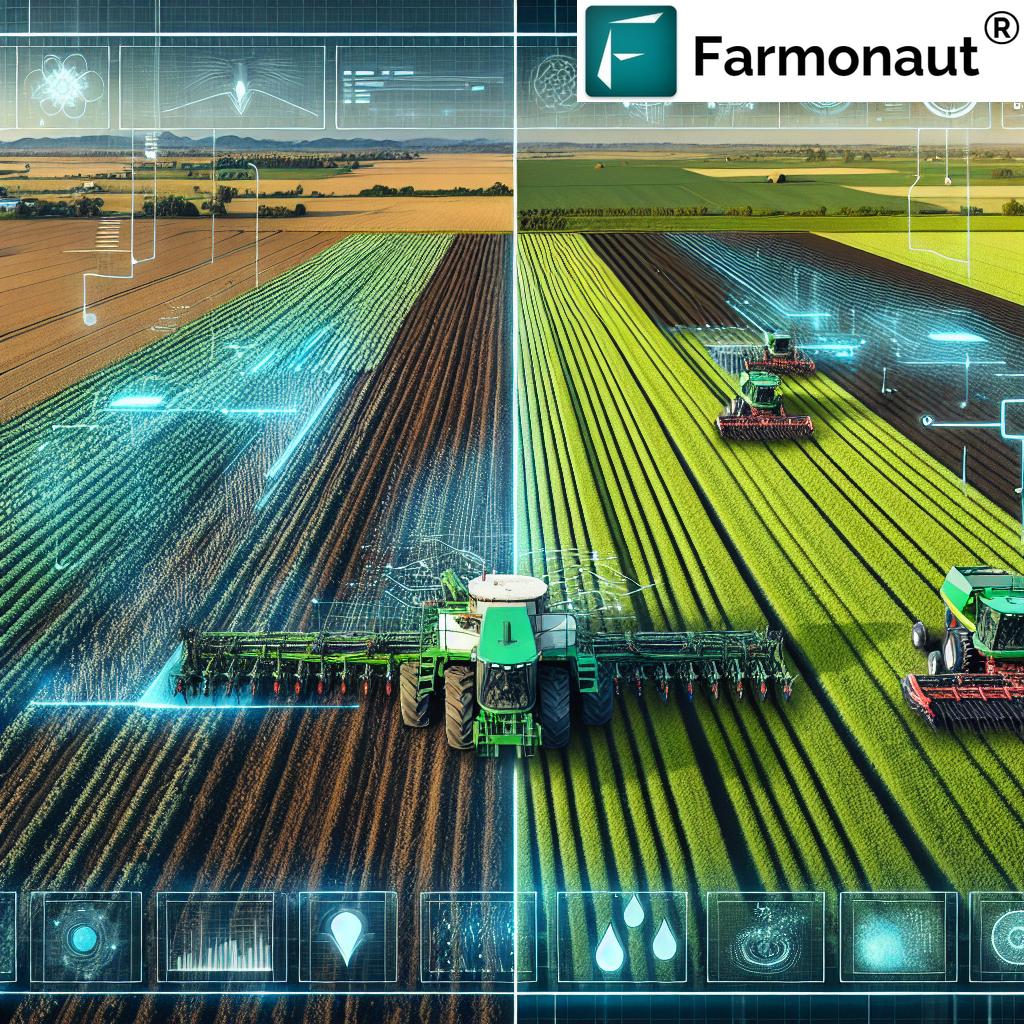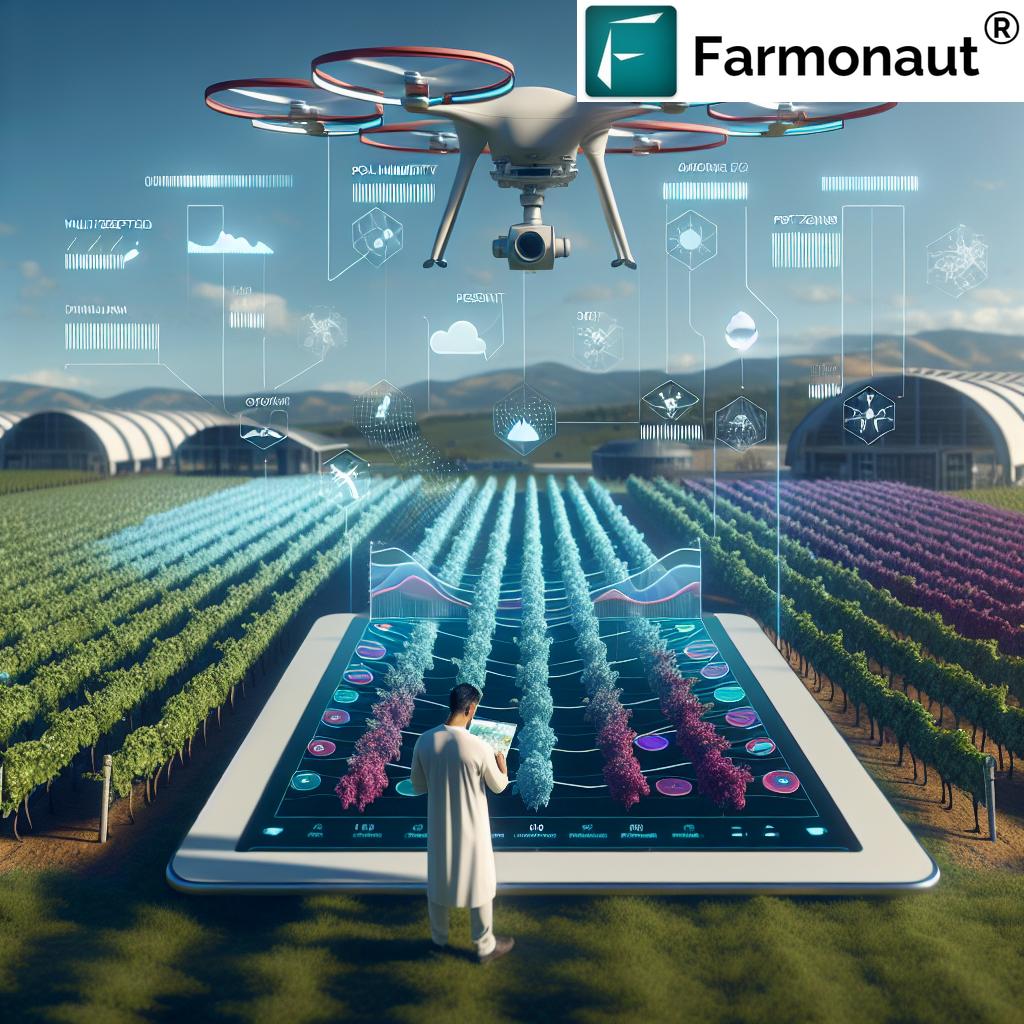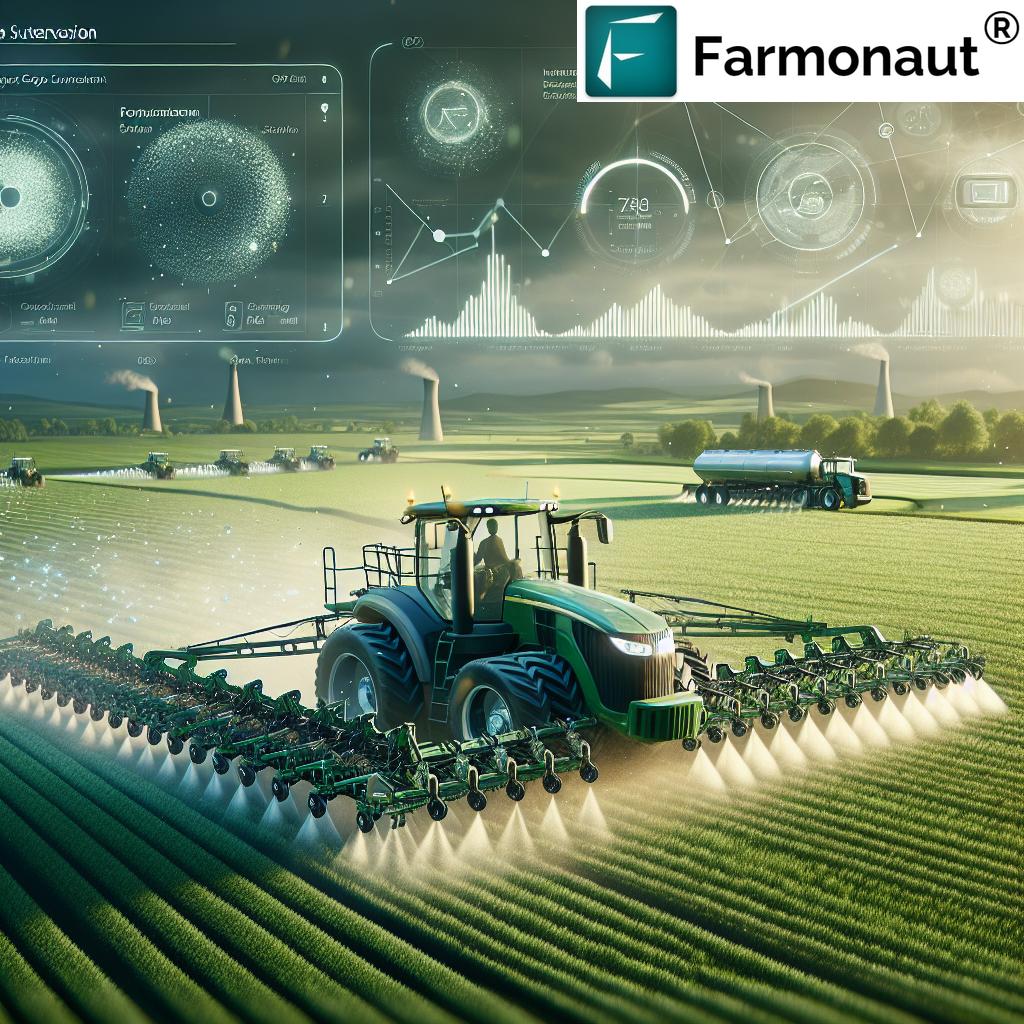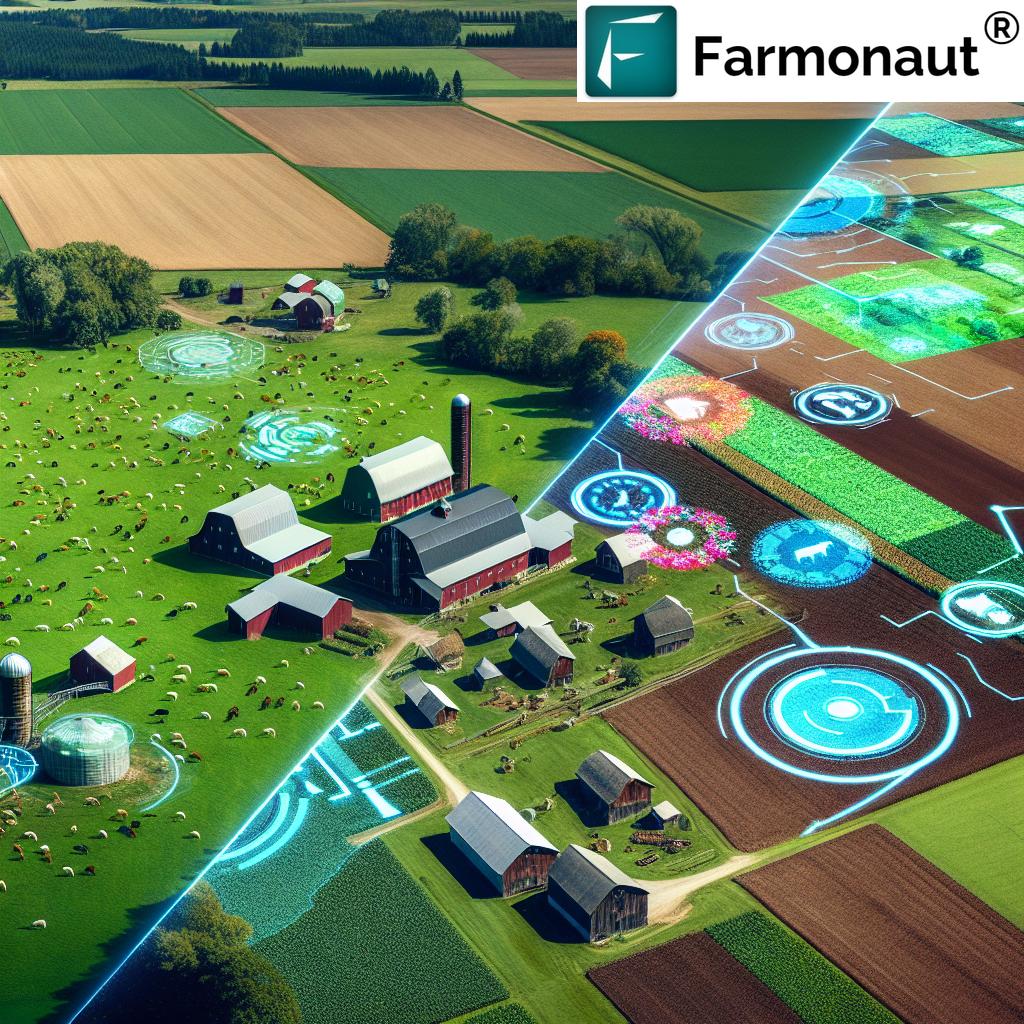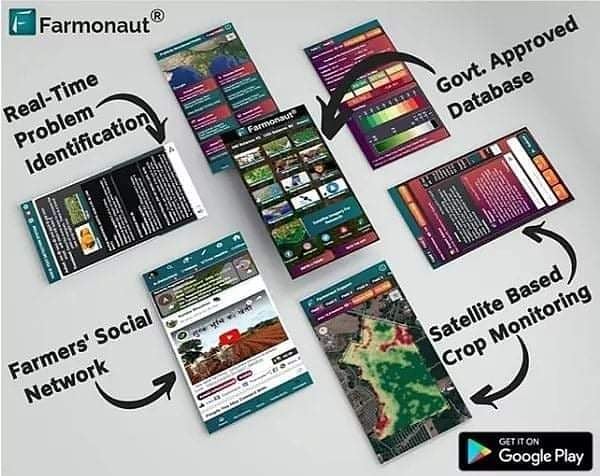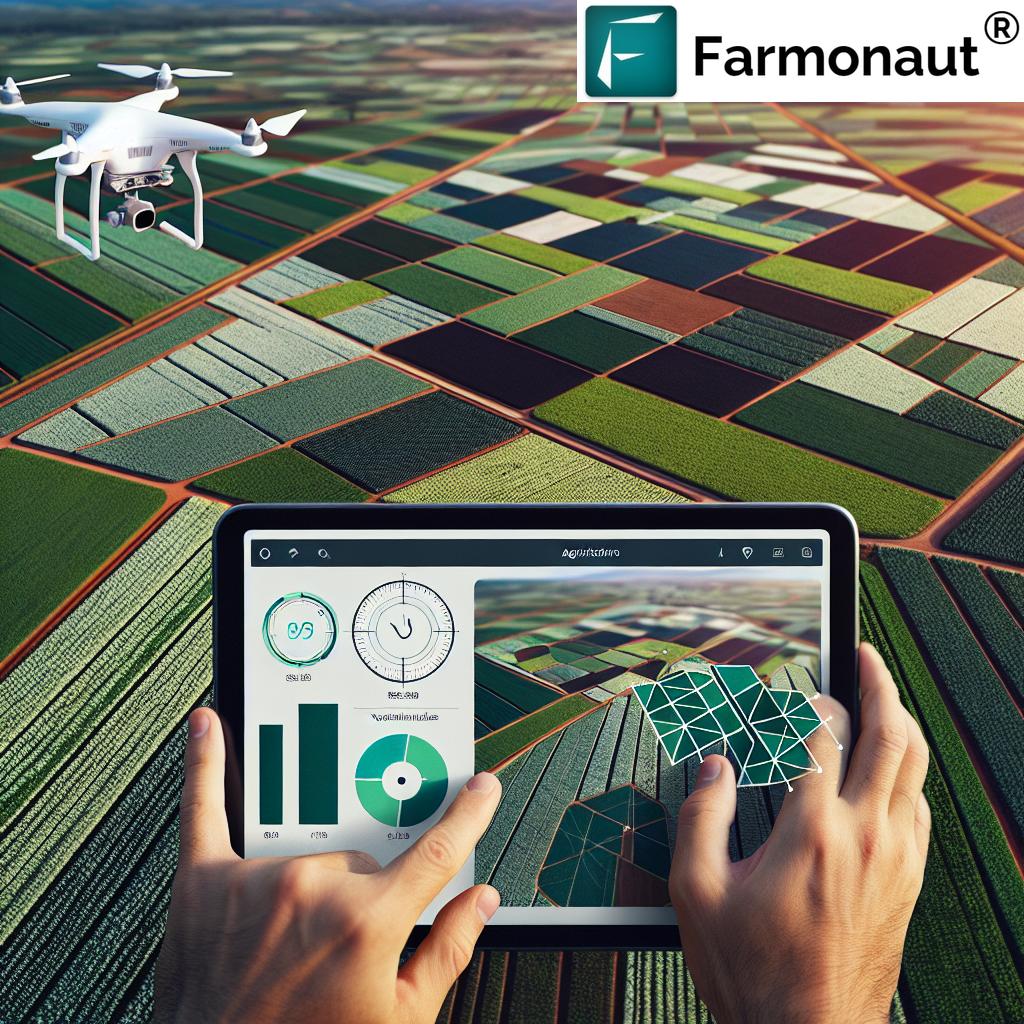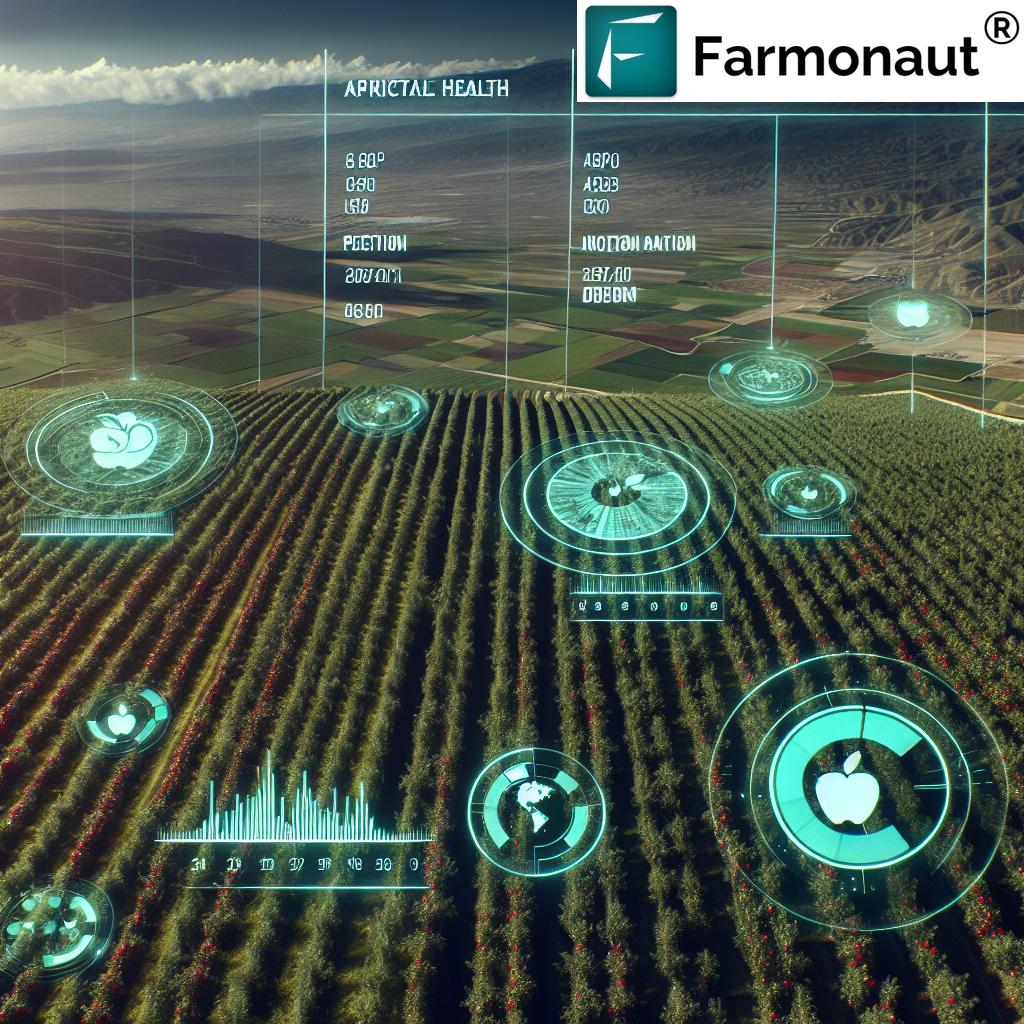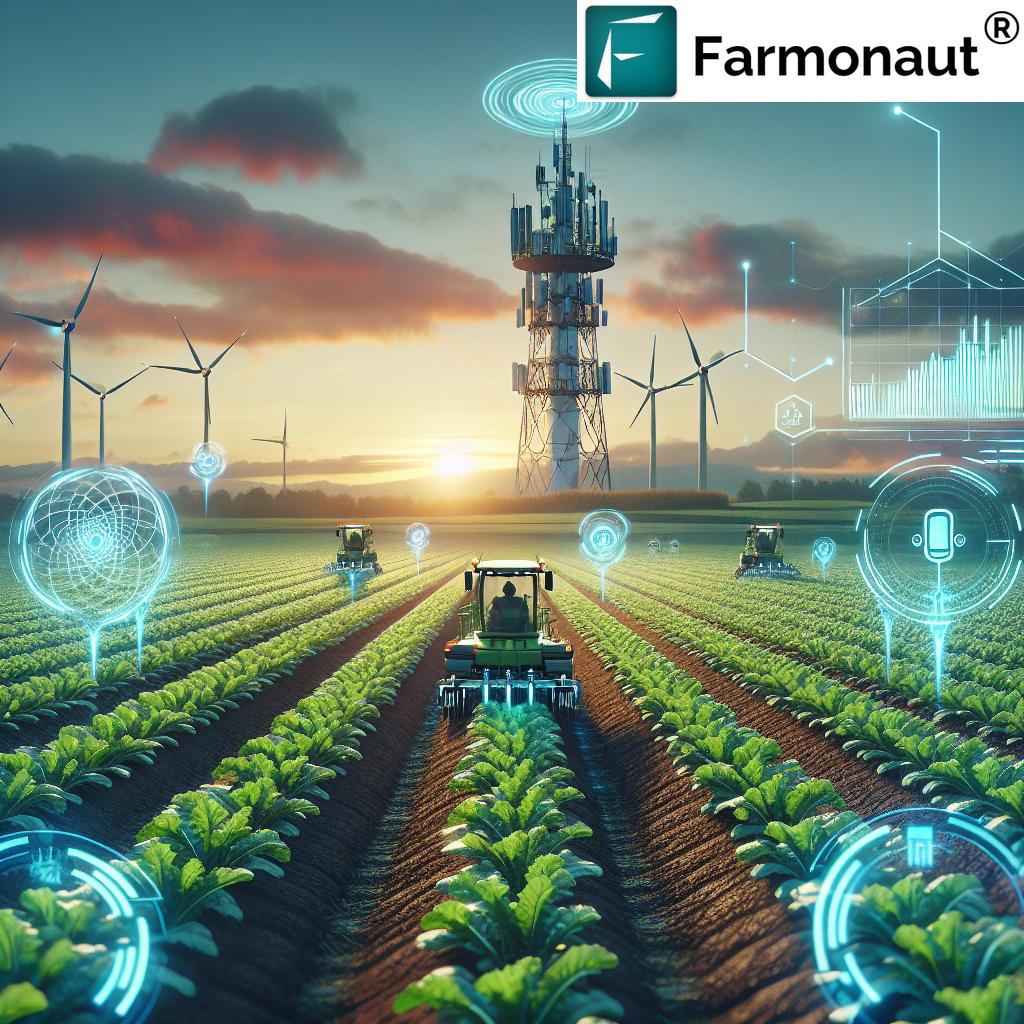Revolutionizing Agriculture: How Farmonaut’s Digital Tools Drive Climate-Resilient Farming in Baku and Beyond
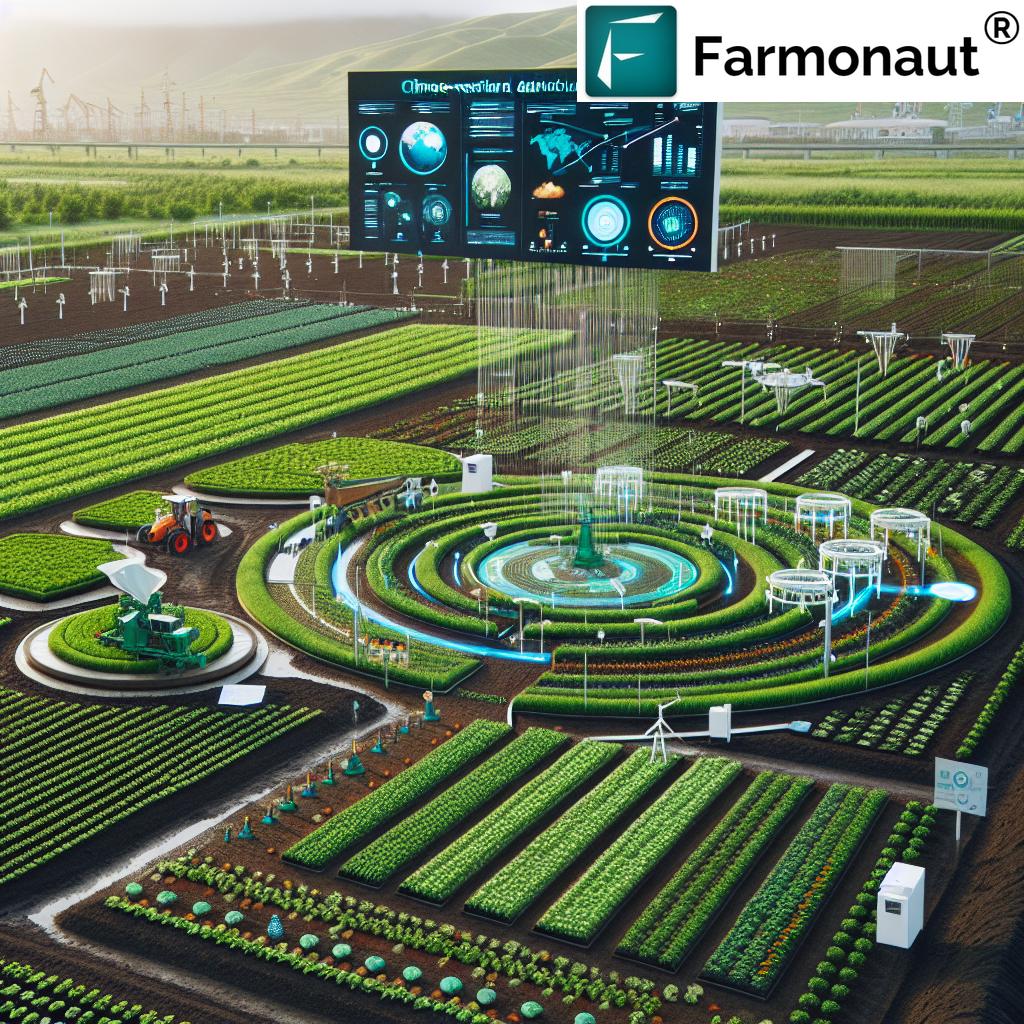
“Precision agriculture can reduce water usage by up to 30% while improving crop yields by 20%.”
As we stand on the brink of a new era in agriculture, the global farming community is facing unprecedented challenges. Climate change, resource scarcity, and the need to feed a growing population are pushing us to reimagine our approach to farming. At the forefront of this agricultural revolution are digital tools and data-driven solutions that are transforming the way we grow food. In this comprehensive exploration, we’ll delve into how these innovations are shaping climate-resilient agriculture, with a special focus on the impact in Baku and beyond.
The Dawn of Climate-Resilient Agriculture
Climate-resilient agriculture is more than just a buzzword; it’s a necessity in our changing world. As temperatures rise and weather patterns become increasingly unpredictable, farmers need new strategies to ensure food security. This is where companies like Farmonaut come into play, offering cutting-edge digital tools that empower farmers to make data-driven decisions.
We’re witnessing a paradigm shift in farming practices, moving from traditional methods to precision farming techniques that optimize resource use and boost productivity. These innovative approaches are particularly crucial for marginalized communities and low-income regions, where the impacts of climate change are often felt most acutely.
Digital Tools: Bridging the Knowledge Gap
One of the most significant challenges in agriculture has been the information gap between agricultural experts and rural farmers. Traditional extension services, which have been the primary means of disseminating knowledge, are facing dwindling funding. This is where digital tools are making a revolutionary impact.
- Real-time information in local languages
- Accessible through smartphones and tablets
- Customized advice based on local conditions
By providing farmers with immediate access to crucial information, these tools are democratizing agricultural knowledge. Farmonaut’s platform, for instance, offers satellite-based crop health monitoring and AI-driven advisory systems, putting expert-level insights into the hands of farmers.
Precision Farming: Tailoring Agriculture to the Plot
Precision agriculture is at the heart of climate-resilient farming. This approach uses data to tailor agricultural inputs to the specific needs of different plots. The benefits are twofold: it minimizes waste and reduces environmental impact while maximizing productivity.
- Optimized water usage
- Targeted fertilizer application
- Reduced pesticide use
For example, if one area of a field requires 20 milliliters of water while another needs only 10, precision agriculture ensures that water is distributed accordingly. This level of precision is particularly valuable in water-scarce regions, where every drop counts.
Biodiversity: The Backbone of Resilient Farming Systems
Agricultural biodiversity plays a crucial role in building resilient farming systems. By cultivating a diverse range of crops, farmers can better withstand pests, diseases, and climatic shocks. Organizations like CGIAR are at the forefront of developing resilient crop varieties that can thrive in challenging conditions.
- Flood-tolerant rice varieties
- Drought-resistant maize
- Heat-tolerant wheat
These innovations are not just about survival; they’re about thriving in the face of adversity. By integrating these resilient crops into their farming systems, farmers can ensure food security even when faced with extreme weather events.
Greenhouse Gas Reduction: Agriculture as Part of the Solution
Agriculture is responsible for about 33% of global greenhouse gas emissions. However, with the right practices, it can also be part of the solution. Transitioning to low-emission farming methods is crucial for achieving our climate goals.
- Alternative wetting and drying in rice cultivation
- Cover cropping to sequester carbon
- Precision fertilizer application to reduce nitrous oxide emissions
These practices not only reduce emissions but can also improve yields and soil health. For instance, alternative wetting and drying in rice fields can decrease methane emissions by up to 48% while maintaining or even increasing yields.
Explore Farmonaut’s API for advanced agricultural data
Rural Internet Access: A Gateway to Climate Information
In the digital age, internet access is becoming as crucial for farmers as seeds and soil. Improved rural internet coverage can provide farmers with timely climate information, including rainfall predictions and temperature forecasts. This information is invaluable for making informed decisions about planting, harvesting, and resource management.
- Access to weather forecasts
- Early warning systems for extreme weather events
- Sharing of best practices among farming communities
Farmonaut’s platform leverages this connectivity to deliver real-time satellite data and AI-powered insights directly to farmers’ devices, enabling them to make data-driven decisions that improve resilience and productivity.
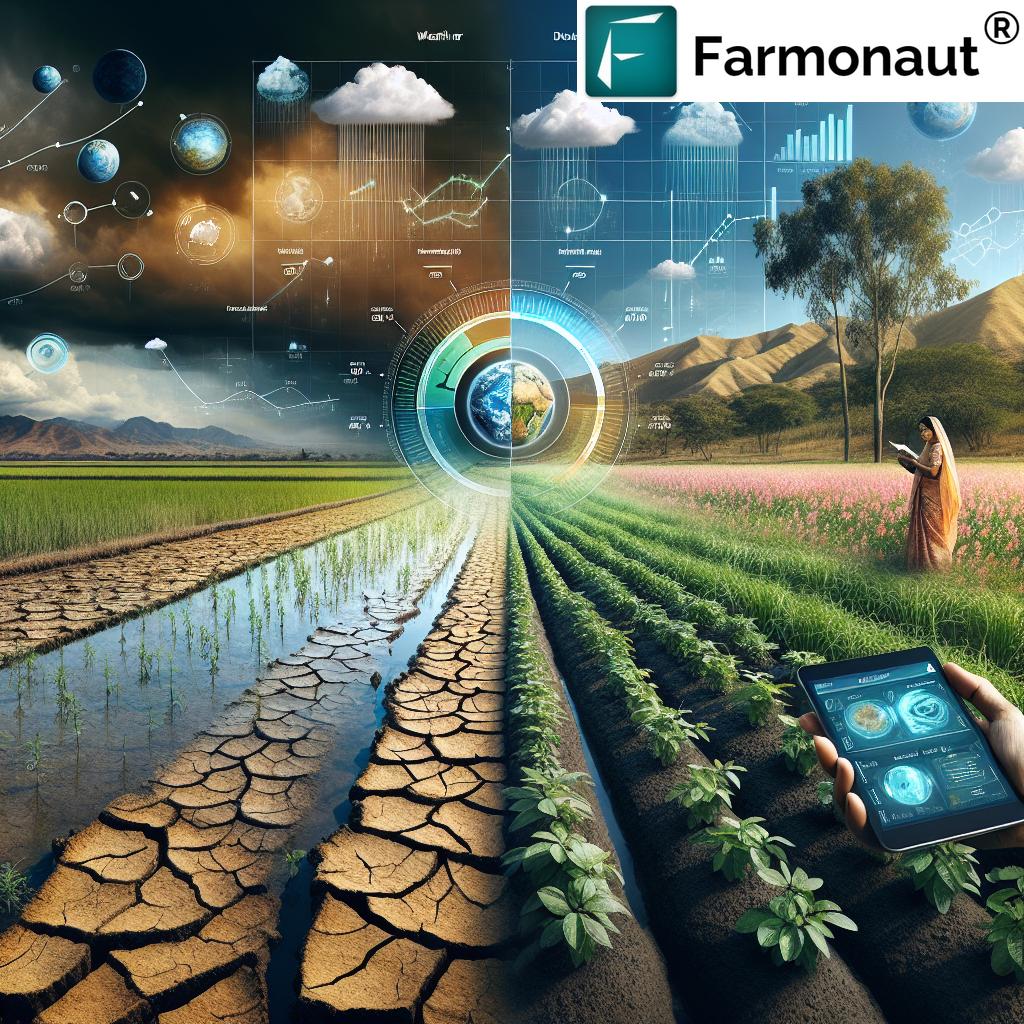
Innovations for Vulnerable Regions
Climate-resilient agriculture is particularly crucial for vulnerable regions, including many parts of the Global South. Innovations in this space are focused on closing the yield gap between high- and low-income nations, supporting farmers through:
- Drought-resistant crop varieties
- Small-scale irrigation solutions
- Improved market access
By integrating these innovations, farmers in vulnerable regions can become more resilient to climate shocks and achieve more stable incomes. This, in turn, contributes to food security and economic stability in these areas.
“Climate-resilient farming practices can potentially reduce greenhouse gas emissions from agriculture by 15-20%.”
The Role of Data in Shaping Climate-Smart Policies
Data-driven farming solutions are not just transforming practices on the ground; they’re also informing policy decisions at the highest levels. By providing accurate, real-time information on agricultural productivity, resource use, and environmental impact, these tools are enabling policymakers to craft more effective climate-smart agricultural policies.
- Evidence-based policy formulation
- Targeted support for vulnerable farming communities
- Monitoring and evaluation of agricultural interventions
Farmonaut’s satellite-based monitoring and AI analytics contribute to this data ecosystem, offering valuable insights that can shape national and international agricultural strategies.
Access Farmonaut’s API Developer Docs for integration
Sustainable Practices for Soil Health and Water Conservation
At the core of climate-resilient agriculture are practices that enhance soil fertility and optimize water usage. These sustainable methods not only improve crop yields but also contribute to long-term environmental health.
- Conservation tillage to reduce soil erosion
- Crop rotation to improve soil structure and nutrient content
- Drip irrigation for efficient water use
Farmonaut’s digital tools support these practices by providing detailed soil moisture data and crop health information, allowing farmers to make precise decisions about irrigation and nutrient management.
The Future of Agriculture: Addressing Global Challenges
As we look to the future, it’s clear that agriculture must evolve to meet the challenges of climate change, population growth, and resource scarcity. Climate-resilient agriculture, powered by digital tools and data-driven solutions, offers a path forward.
- Increased food production with reduced environmental impact
- Enhanced resilience to climate shocks
- Improved livelihoods for farming communities
By embracing these innovations, we can create a more sustainable and equitable food system that supports vulnerable communities worldwide while addressing global environmental concerns.
Comparative Analysis: Traditional vs. Climate-Resilient Farming Practices
| Aspect | Traditional Methods | Climate-Resilient Methods |
|---|---|---|
| Crop Selection | Limited variety, often based on historical preferences | Diverse, resilient varieties adapted to changing climate conditions |
| Water Management | Flood irrigation, often inefficient | Precision irrigation, based on real-time soil moisture data |
| Soil Health | Heavy tillage, potential for soil degradation | Conservation tillage, cover cropping for soil improvement |
| Pest Control | Broad-spectrum pesticides | Integrated Pest Management, targeted interventions |
| Yield Optimization | Based on general guidelines and past experience | Data-driven decisions using satellite imagery and AI analytics |
| Greenhouse Gas Emissions | Often high due to inefficient practices | Reduced through precision farming and sustainable techniques |
| Biodiversity Impact | Often negative due to monoculture | Positive, promoting diverse ecosystems and crop varieties |
| Technology Integration | Limited, mostly mechanical tools | Extensive use of digital tools, satellites, and AI |
| Climate Information Access | Limited to general forecasts | Real-time, localized climate data and predictions |
| Farmer Knowledge Support | Reliance on traditional knowledge and limited extension services | Access to global best practices and expert advice through digital platforms |
Empowering Farmers with Digital Solutions
The transition to climate-resilient agriculture is not just about adopting new technologies; it’s about empowering farmers with the knowledge and tools they need to thrive in a changing world. Digital platforms like Farmonaut are at the forefront of this transformation, offering:
- User-friendly interfaces accessible on smartphones and tablets
- Integration of local knowledge with global best practices
- Customized recommendations based on individual farm conditions
By putting powerful tools in the hands of farmers, we’re enabling them to become active participants in the fight against climate change while improving their livelihoods.
The Road Ahead: Challenges and Opportunities
While the potential of climate-resilient agriculture is immense, there are still challenges to overcome. These include:
- Ensuring equitable access to digital tools and internet connectivity
- Addressing the digital literacy gap in rural communities
- Balancing technological innovation with traditional farming wisdom
However, with each challenge comes an opportunity for innovation and collaboration. As we continue to develop and refine digital tools for agriculture, we must ensure that they remain accessible, user-friendly, and tailored to the needs of diverse farming communities.
Conclusion: A Sustainable Future for Agriculture
As we look towards COP29 in Baku and beyond, it’s clear that climate-resilient agriculture will play a crucial role in our global response to climate change. By leveraging digital tools, data-driven solutions, and innovative farming practices, we can create a more sustainable, productive, and equitable agricultural system.
Farmonaut and other pioneers in this space are not just providing tools; they’re catalyzing a transformation in how we approach farming. From the fields of Baku to farms around the world, these digital solutions are empowering farmers to become stewards of the environment while ensuring food security for future generations.
As we embrace this new era of agriculture, let’s remember that every data point, every satellite image, and every AI-powered recommendation is a step towards a more resilient and sustainable future. The seeds of change have been planted; now it’s up to us to nurture them into a bountiful harvest for all.
Frequently Asked Questions
Q: What is climate-resilient agriculture?
A: Climate-resilient agriculture refers to farming practices that are designed to adapt to and mitigate the effects of climate change. It involves using sustainable methods, innovative technologies, and data-driven decision-making to ensure food security and environmental sustainability in the face of changing weather patterns and environmental challenges.
Q: How do digital tools contribute to climate-resilient farming?
A: Digital tools contribute to climate-resilient farming by providing real-time data on crop health, soil conditions, and weather patterns. They enable precision agriculture, which optimizes resource use and reduces waste. These tools also facilitate better decision-making by giving farmers access to expert advice and global best practices.
Q: What role does biodiversity play in climate-resilient agriculture?
A: Biodiversity is crucial for building resilient farming systems. It helps to reduce vulnerability to pests and diseases, improves soil health, and provides a buffer against climate shocks. Diverse crop varieties, especially those developed to withstand specific environmental stresses, are key to maintaining productivity in changing conditions.
Q: How can farmers access and use Farmonaut’s digital tools?
A: Farmers can access Farmonaut’s digital tools through web and mobile applications. These tools provide satellite-based crop health monitoring, AI-driven advisory systems, and other precision farming solutions. Farmers can sign up for subscriptions tailored to their needs and farm size.
Q: What are some examples of greenhouse gas reduction practices in agriculture?
A: Some examples include alternative wetting and drying in rice cultivation to reduce methane emissions, precision fertilizer application to minimize nitrous oxide emissions, and cover cropping to sequester carbon in the soil. These practices not only reduce emissions but can also improve crop yields and soil health.
Q: How does precision agriculture help in water conservation?
A: Precision agriculture helps in water conservation by providing detailed data on soil moisture levels and crop water needs. This allows farmers to apply water precisely where and when it’s needed, reducing waste and ensuring optimal use of this precious resource.
Q: Can small-scale farmers benefit from climate-resilient agriculture technologies?
A: Yes, small-scale farmers can significantly benefit from climate-resilient agriculture technologies. Many digital tools, including those offered by Farmonaut, are designed to be accessible and affordable for farmers of all scales. These technologies can help small-scale farmers improve their productivity, reduce risks, and increase their resilience to climate challenges.






